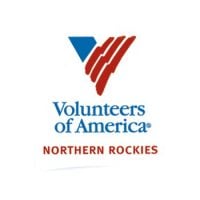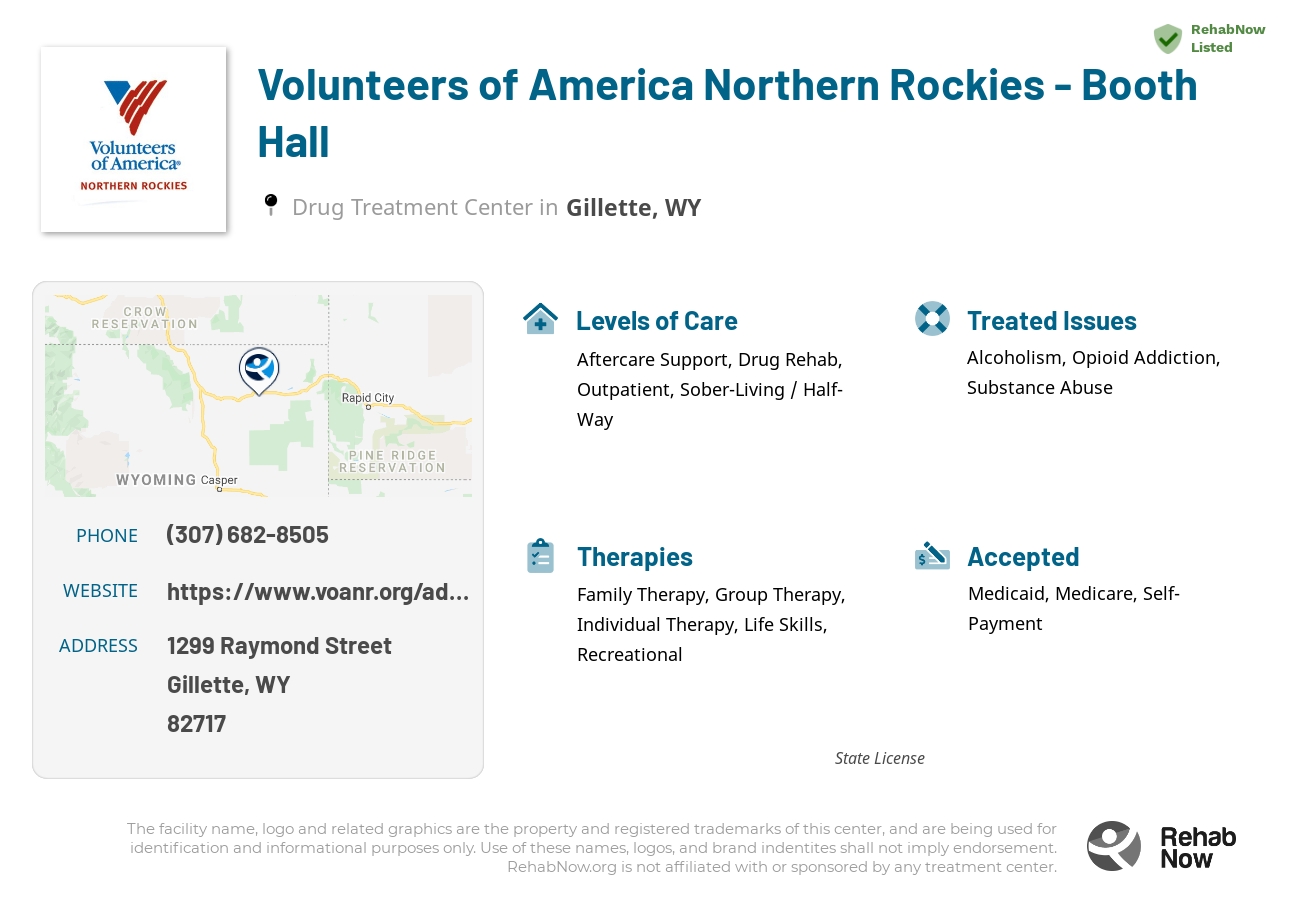Volunteers of America Northern Rockies - Booth Hall
Drug Rehab Center in Gillette, Wyoming
Volunteers of America Northern Rockies - Booth Hall in Gillette, Wyoming, offers comprehensive addiction treatment services, including detoxification, residential and inpatient services, outpatient care, and aftercare support for individuals struggling with substance use and behavioral health issues.
About
Located in Gillette, Wyoming, Volunteers of America Northern Rockies- Booth Hall serves adults reentering society after incarceration, focusing on alcohol and drug rehab. The facility can accommodate 144 individuals, offering a unique blend of residential treatment and case management tailored to support long-term change and reintegration.
Certified by CARF and SAMHSA and holding a state license, Booth Hall emphasizes individualized treatment for each person. Their approach combines residential programs, clinically based treatments, and extensive support services aimed at fostering successful societal reintegration.
- Individualized case management addresses the specific needs of each resident to aid their recovery journey.
- Residents have access to a variety of services including healthcare, budgeting, 12 Step programs, GED preparation, and college courses.
- Emphasizes a comprehensive approach with psycho-educational groups and addiction treatment, preparing individuals for long-term sobriety.
Booth Hall specializes in treating alcoholism, opioid addiction, substance abuse, and dual diagnosis. Their treatment methods include detoxification, residential and inpatient services, outpatient support, and a focus on relapse prevention and continuing care to ensure a well-rounded recovery process.
Genders
Ages
Modality
Additional
Accreditations
State License
SAMHSA

CARF
The Commission on Accreditation of Rehabilitation Facilities (CARF) is a non-profit organization that specifically accredits rehab organizations. Founded in 1966, CARF's, mission is to help service providers like rehab facilities maintain high standards of care.
Conditions and Issues Treated
Recovering from substance abuse is an essential part of a healthy life for many people. It’s a long and challenging process, but it can be worth it in the end if you manage to get through all parts. Detoxifying your body, rehabilitation after that time passes or when needed (depending on what type), and then recovery while also receiving therapy support throughout this entire process.
A standard route to starting recovering from substance abuse and addiction is through a detoxification center. There you can completely heal your body and mind and continue on the path of recovery without feeling any of the lingering effects of substances.
Within the past decade, opioid addiction has become a nationwide epidemic. The United States hosts one of the world’s highest rates of opioid use or abuse and has one of the highest rates of opioid-related deaths. In the United States, opioid drugs are classified as Schedule II-IV controlled substances due to their highly addictive properties and potential for abuse. These include morphine, opium, heroin, oxycodone, hydrocodone, methadone, and fentanyl. Physicians usually prescribe opioids to help control pain.
Over time, opioid users develop a tolerance for the drugs, which makes it difficult, if not impossible, to function without them. In turn, opioid users often resort to illicit means of obtaining the drugs. These means can include drug dealers, friends, and family members who do not have legitimate prescriptions for the drugs. Opioid addiction can quickly lead to heroin use, especially those seeking more intense highs than prescription opioids offer. Due to the high risk of overdose, heroin users are at a much higher risk for illness and death.
Levels of Care Offered
This center offers a variety of custom treatment tailored to individual recovery. Currently available are Aftercare Support, Drug Rehab, Outpatient, Residential, Sober-Living / Half-Way, with additional therapies available as listed below.
An outpatient treatment program is set up to help with alcohol or drug addiction or a co-occurring disorder. The treatment must attend the treatment facility for their therapy and other programs but return home each night. The frequency of mandatory attendance decreases after much of the treatment program is complete. The treatment programs are monitored by the treatment facility and case managers who work for a judge or judge’s office. A treatment program may be performed out of a treatment facility, treatment clinic, or treatment center.
The benefits of outpatient treatment programs are many. One of the most beneficial treatment programs is that it allows treatment for clients who cannot afford or may not be able to attend treatment at a treatment facility, treatment center, or treatment clinic full-time. Another benefit of treatment programs is that they reduce crime rates because treatment allows people to treat their addiction.
Sober living homes are halfway houses where people stay for a certain amount of time with the opportunity to stabilize themselves when they’re in recovery. Residents must follow the rules like no drinking and using drugs, paying rent/bills, etc. There is no minimum or maximum period of stay; as long you abide by these simple guidelines, then it’s an excellent chance to move forward into sobriety!
For many, this is a fresh start, a time to reset the calendar. Some have lost everything due to addiction, so being in sober living allows them to try again or begin for the first time by establishing new routines and healthy habits that will result in long-term sobriety. It’s also common for people to move from one sober living home to another. Each move gets them closer and closer to their final destination of a drug & alcohol-free life.
Residential treatment programs are those that offer housing and meals in addition to substance abuse treatment. Rehab facilities that offer residential treatment allow patients to focus solely on recovery, in an environment totally separate from their lives. Some rehab centers specialize in short-term residential treatment (a few days to a week or two), while others solely provide treatment on a long-term basis (several weeks to months). Some offer both, and tailor treatment to the patient’s individual requirements.
Recovering drug addicts need aftercare support when they leave treatment. The support can include guidance through 12-step programs, outpatient rehabilitation programs, and support groups. Aftercare supports the individual in their desire to maintain sobriety by reducing relapse risk with positive choices.
The success of drug treatment does not end when the addict leaves the rehabilitation center. There is no such thing as a “one and done” type of rehabilitation process. Recovery is a lifelong journey that begins with treatment and continues by the addict committing to outside support groups or drug rehab programs.
When choosing a program, it is crucial to choose one that will provide long-term aftercare support. This ensures that you have the tools you need to sustain your recovery.
Therapies & Programs
Individualized Treatment is essential because it gives addicts the ability to participate in a program that meets their unique needs. An addict should work with professionals who understand what they’re going through, especially if the addict is actively using. Finding the right treatment program for an addict is difficult, but it’s even harder without communicating with those who have experience treating your specific situation.
The therapies typically involve all family members, potentially including siblings, children, and parents who play a role in their daily lives. These sessions can be essential because they address past issues that may have affected an addict or alcoholic’s recovery process. They provide support during this time when it is needed most!
A family therapy session, often called a family meeting or intervention, is a necessary process that helps loved ones of addicts see their situation in a new light. It’s also one of the most challenging things families will ever have to do when they’re facing a loved one battling addiction or alcoholism.
Group therapy sessions provide recovering addicts with a chance to cope with everyday situations that many face. Group therapy sessions are held in rehab facilities, clinics, churches or community centers that offer drug addiction treatment.
People who attend these groups are encouraged to voice their feelings and support other addicts in recovery. This helps group members strengthen their own recovery program while cheering on others who are struggling with sobriety.
Life skills training is beneficial for addicts in recovery because it helps them learn how to take care of themselves and improve their quality of life, which can promote feelings of purpose and motivation.
This works by teaching individuals life-enhancing skills that support positive living, including:
- Healthy lifestyle habits
- Skills to effectively manage stress
- Effective communication skills to help them get their needs met without turning to drugs or alcohol
- Money management and budgeting skills so they can continue to take care of themselves after treatment ends.
Payment Options Accepted
For specific insurance or payment methods please contact us.
Volunteers of America Northern Rockies Associated Centers
Discover treatment facilities under the same provider.
- Volunteers of America Northern Rockies - The Life House in Sheridan, WY
- Volunteers of America Northern Rockies - The Gathering Place in Sheridan, WY
- Volunteers of America Northern Rockies - Female Recovery Home in Sheridan, WY
- Volunteers of America Northern Rockies - Mens Recovery Home in Sheridan, WY
- Peak Wellness Center - Chrysalis House in Pine Bluffs, WY
Learn More About Volunteers of America Northern Rockies Centers
Additional Details
Specifics, location, and helpful extra information.
Gillette, Wyoming 82717 Phone Number(307) 682-8505 Meta DetailsUpdated April 15, 2024
Staff Verified
Patient Reviews
There are no reviews yet. Be the first one to write one.
Gillette, Wyoming Addiction Information
Wyoming has some of the highest rates of alcohol abuse and/or dependency in the nation. Drug and alcohol rehabilitation and treatment are so low that the state ranks 48th in the for admittance to drug and alcohol rehab. Marijuana use remains illegal in Wyoming, both for medical and recreational use, but is the second-largest drug threat in the state.
In Gillette, 10,000 people struggle with addiction to drugs or alcohol, approximately 11% of the population is affected by addiction. From 1999 to 2016 drug overdoses, alcohol poisonings, and drug overuse deaths highly increased. It is estimated that drug addiction and abuse costs Gillette residents, more than $50 million each year. There are many drug treatment centers in Gillette and each offers its own unique set of therapies and treatment plans.
Treatment in Nearby Cities
- Rock Springs, WY (262.9 mi.)
- Powell, WY (165.4 mi.)
- Thermopolis, WY (142.0 mi.)
- Gillette, WY (3.6 mi.)
- Afton, WY (292.8 mi.)
Centers near Volunteers of America Northern Rockies - Booth Hall
The facility name, logo and brand are the property and registered trademarks of Volunteers of America Northern Rockies - Booth Hall, and are being used for identification and informational purposes only. Use of these names, logos and brands shall not imply endorsement. RehabNow.org is not affiliated with or sponsored by Volunteers of America Northern Rockies - Booth Hall.





